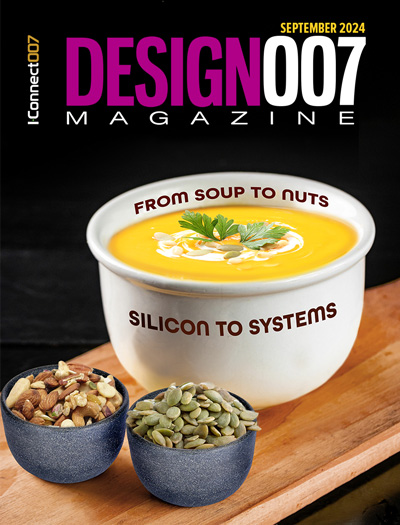-

- News
- Books
Featured Books
- design007 Magazine
Latest Issues
Current Issue
Rules of Thumb
This month, we delve into rules of thumb—which ones work, which ones should be avoided. Rules of thumb are everywhere, but there may be hundreds of rules of thumb for PCB design. How do we separate the wheat from the chaff, so to speak?

Partial HDI
Our expert contributors provide a complete, detailed view of partial HDI this month. Most experienced PCB designers can start using this approach right away, but you need to know these tips, tricks and techniques first.

Silicon to Systems: From Soup to Nuts
This month, we asked our expert contributors to weigh in on silicon to systems—what it means to PCB designers and design engineers, EDA companies, and the rest of the PCB supply chain... from soup to nuts.
- Articles
- Columns
Search Console
- Links
- Media kit
||| MENU - design007 Magazine
Samsung Begins Industry's First Mass Production of QLC 9th-Gen V-NAND for AI Era
September 13, 2024 | BUSINESS WIREEstimated reading time: 2 minutes
Samsung Electronics Co., Ltd., the world leader in advanced memory technology, announced it has begun mass production of its one-terabit (Tb) quad-level cell (QLC) 9th-generation vertical NAND (V-NAND).
With the industry’s first mass production of QLC 9th-generation V-NAND, following the industry’s first triple-level cell (TLC) 9th-generation V-NAND production in April this year, Samsung is solidifying its leadership in the high-capacity, high-performance NAND flash market.
“Kicking off the successful mass production of QLC 9th-generation V-NAND just four months after the TLC version allows us to offer a full lineup of advanced SSD solutions that address the needs for the AI era,” said SungHoi Hur, Executive Vice President and Head of Flash Product & Technology at Samsung Electronics. “As the enterprise SSD market shows rapid growth with stronger demand for AI applications, we will continue to solidify our leadership in the segment through our QLC and TLC 9th-generation V-NAND.”
Samsung plans to expand applications of the QLC 9th-generation V-NAND, starting with branded consumer products and extending into mobile Universal Flash Storage (UFS), PCs and server SSDs for customers including cloud service providers.
Samsung's QLC 9th-generation V-NAND brings together a number of innovations that have produced technological breakthroughs:
- Samsung’s unrivaled Channel Hole Etching technology was used to achieve the highest layer count in the industry with a double stack structure. Utilizing the technological expertise gained from the TLC 9th-generation V-NAND, the area of the cells and the peripheral circuits have been optimized, achieving an industry-leading bit density approximately 86% higher than that of the previous generation QLC V-NAND.
- Designed Mold technology adjusts the spacing of Word Lines (WL), which operate the cells, to ensure uniformity and optimization of cell characteristics across and within layers. These traits have become increasingly important as the V-NAND layer counts increase. Adopting Designed Mold has improved data retention performance by roughly 20% compared to previous versions, leading to enhanced product reliability.
- Predictive Program technology anticipates and controls cell state changes to minimize unnecessary actions. Samsung’s QLC 9th-generation V-NAND has doubled write performance and improved data input/output speed by 60% through advancements to this technology.
- Data read and write power consumption decreased by about 30% and 50% respectively, with the use of Low-Power Design technology. This method reduces the voltage that drives NAND cells and minimizes power consumption by sensing only the necessary bit lines (BL).
Suggested Items
Global Top 5 SSD Module Makers Continue to Gain Market Share; Chinese Brands Leverage Home Advantage
10/23/2024 | TrendForceTrendForce’s latest investigations reveal that the combined market share of the top five SSD module makers in the retail sector has surged from 59% in 2022 to 72% in 2023, reinforcing a trend of larger companies expanding their dominance.
Increased Production and Weakened Demand to Drive NAND Flash Prices Down 3–8% in 4Q24
10/15/2024 | TrendForceTrendForce’s latest findings reveal that NAND Flash products have been impacted by weaker-than-expected seasonal demand in the second half of 2024, leading to a decline in wafer contract prices in Q3. This downward trend is projected to deepen, with prices expected to drop by more than 10% in Q4.
NAND Flash Shipments Growth Slows in 2Q24, Revenue Up 14% Driven by AI SSD Demand
09/09/2024 | TrendForceTrendForce reports that NAND Flash prices continued to rise in 2Q24 as server inventory adjustments neared completion and AI spurred demand for high-capacity storage products. However, high inventory levels among PC and smartphone buyers led to a 1% QoQ decline in NAND Flash bit shipments.
Micron Announces Volume Production of Ninth-Generation NAND Flash Technology
08/01/2024 | MicronMicron Technology, Inc., announced that it is shipping ninth-generation (G9) TLC NAND in SSDs, making it the first in the industry to achieve this milestone.
Memory Industry Revenue Expected to Reach Record High in 2025 Due to Increasing Average Prices and the Rise of HBM and QLC
07/22/2024 | TrendForceTrendForce’s latest report on the memory industry reveals that DRAM and NAND Flash revenues are expected to see significant increases of 75% and 77%, respectively, in 2024, driven by increased bit demand, an improved supply-demand structure, and the rise of high-value products like HBM.


